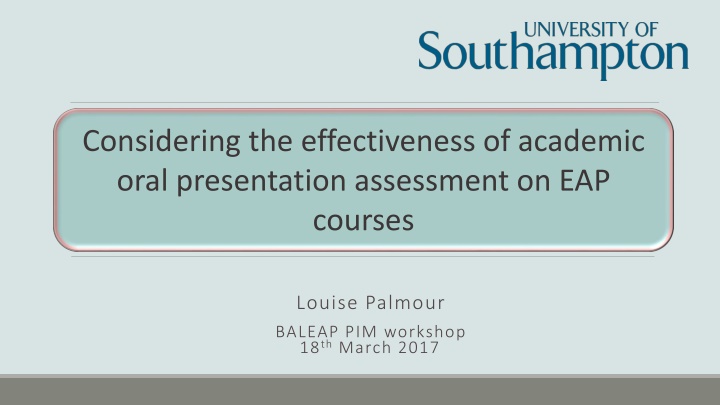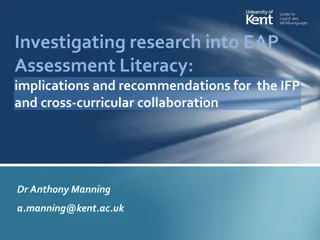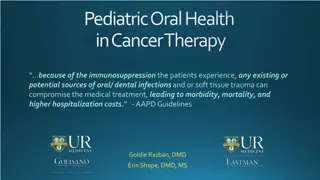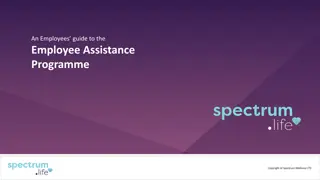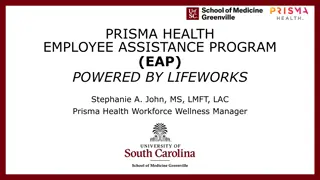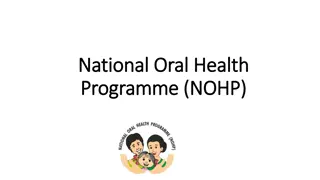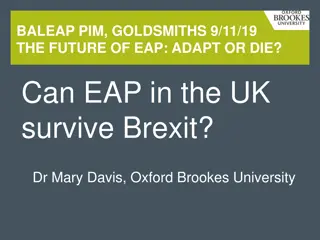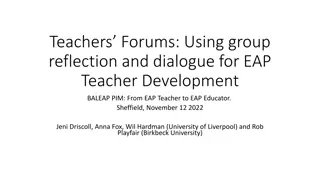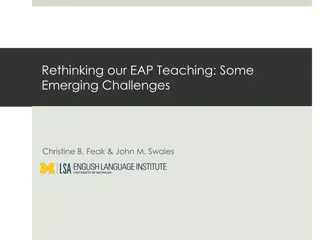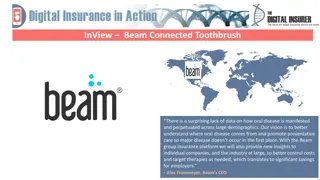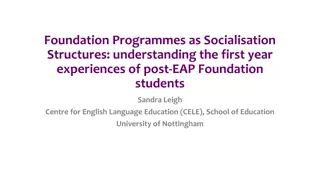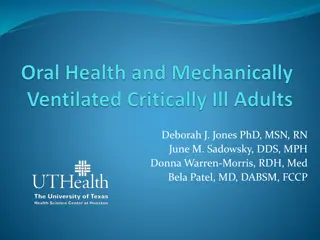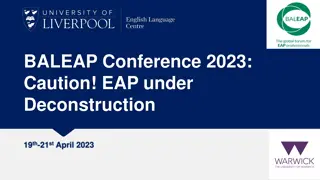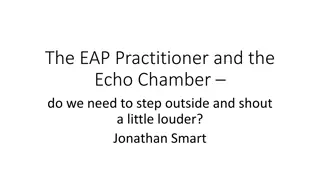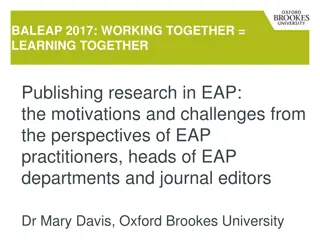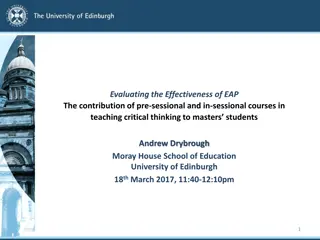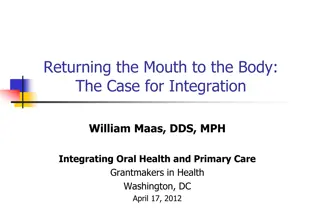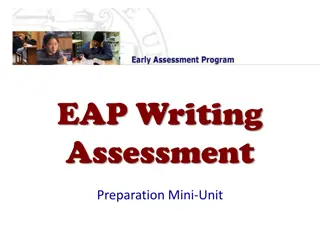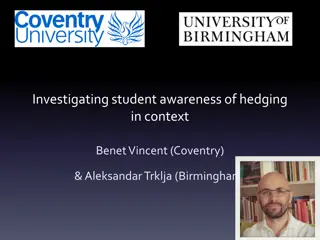Effectiveness of Academic Oral Presentation Assessment in EAP Courses
This workshop discusses the perspectives on the effectiveness of academic oral presentation assessment in English for Academic Purposes (EAP) courses. It explores various types of assessment tasks, criteria used, and the role of oracy skills in assessing students' understanding and ability to communicate content in EAP courses.
Download Presentation

Please find below an Image/Link to download the presentation.
The content on the website is provided AS IS for your information and personal use only. It may not be sold, licensed, or shared on other websites without obtaining consent from the author.If you encounter any issues during the download, it is possible that the publisher has removed the file from their server.
You are allowed to download the files provided on this website for personal or commercial use, subject to the condition that they are used lawfully. All files are the property of their respective owners.
The content on the website is provided AS IS for your information and personal use only. It may not be sold, licensed, or shared on other websites without obtaining consent from the author.
E N D
Presentation Transcript
Considering the effectiveness of academic oral presentation assessment on EAP courses Louise Palmour BALEAP PIM workshop 18thMarch 2017
Workshop overview AOP assessment on subject modules and EAP courses: diversity and patterns Lecturer perspectives on important AOP features Relevance of target domain in EAP AOP assessment Perspectives on the effectiveness of AOPs as an assessment task type on EAP courses Perceptions on role & treatment of oracy skills in AOP assessment Ideas on how to ensure effective AOP assessment on EAP courses
Task 1 AOP marking criteria on subject modules Look at the examples of AOP criteria used on different subject modules on your handout. 1) What different types of AOPs on subject courses do you know of? 2) What do the criteria indicate about AOP assessment on subject modules?
AOP task types on subject modules 2) Chemistry Postgraduate taught Presentation (15mins + 5mins Q&A) 15% To present a project to a panel of expert and non-expert staff and student cohort 1) Electronics and Computer Science Postgraduate taught Group Presentations with poster 5% Present a group design project 3) Business Undergraduate Elevator Pitch 30% Deliver a business pitch to potential investors based on a business plan 4) English Undergraduate Presentation (3mins + 2mins Q&A) 0% Preparatory pitch for your idea/plan for your 2500 word essay Task information taken from a UK university website and task briefs
How are oral presentations a useful assessment task on your module(s)/unit(s)? Shared and interactive experience students become active co- constructors of knowledge Students demonstrate understanding of content & ability to communicate work orally Key transferable and employability skill Module content not necessarily well-suited to AOP assessment Diversifies assessment methods Preliminary findings from online questionnaire data (38 lecturers on UG and PGT modules from 7 UK universities) collection & analysis ongoing
What are the most important features of an AOP on your taught module(s)/unit(s)? Clarity in content and ideas: selectivity, relevance, quality, depth Clarity in communication: pace, intelligibility, use of visuals Timing Clear structure Ability to answer questions Engagement with audience Teamwork skills Preliminary findings from online questionnaire data (38 lecturers on UG and PGT modules from 7 UK universities) collection & analysis ongoing
Assessment components & considerations Formative/summative Individual/paired/group Target audience: expert, non-expert, customer Raters: panel, peer-assessment, self-assessment Discipline conventions: reading from a script Content/Knowledge (40%) Delivery, including structure (40%) Visual Aids (10%) Timing (10%) Archaeology (ID: 2218059) Are AOP assessments testing skills which are not stated as assessment components? Are presentation skills sufficiently developed in instruction? Content Feedback to peers Self reflection post presentation I do not assess presentation skills Accounting (ID: 2225756) Preliminary findings from online questionnaire data (38 lecturers on UG and PGT modules from 7 UK universities) collection & analysis ongoing
Task 2 AOP assessment on EAP courses Use the EAP task information and criteria Discuss similar/different AOP assessment you have been involved in on your EAP courses. Include: 1) Purpose 2) Task details 3) Assessment components
Perspectives on effectiveness of AOPs as a task type Students gain in confidence as language users through giving AOPs (Morita 2000; Boyle 1996) Oral presentation is an effective way to foster the development of skills in HE and an effective speaking assessment tool. (Sundrarajuna & Kiely 2010) Takes up class time; attention wandering from the audience; demands of real time marking; practical difficulties with standardization & double marking; format tends to encourage memorization and presentation fatigue in university. (Pre-sessional course leader at UK university*) *(full quote on handout)
AOP effectiveness and target domain relevance Task 3 1) How does using an oral presentation as an assessment type (not) fit the purposes of EAP assessment? 2) Why are tasks and requirements in the target domain relevant to EAP assessment?* 3)How can AOP assessment reflect the EAP syllabus and the AOP expectations in the target domain? * How do EAP teachers and students question/reformulate these requirements? (Benesch 2001)
Challenges for students delivering an AOP: lecturer perspectives Nerves Timing Structure Some are shy and need encouragement to speak in public regardless of their background though non-native English speakers find that aspect somewhat more challenging. History of Art (ID: 2217951) Clarity. It is the same for native and non-native Engl speakers. Applied Linguistics (ID: 2227784) Preliminary findings from online questionnaire data (38 lecturers on UG and PGT modules from 7 UK universities) collection & analysis ongoing
Subject lecturer perspectives on allowances for NNES minimal, they have chosen to study in English and are expected to be able to communicate effectively in English, as they will mostly be expected to do in the real world Genetics (ID: 2217741) not judging for grammatical and syntax mistakes or taking it a bit slower when presenting Zoology (ID: 2217720) Preliminary findings from online questionnaire data (38 lecturers on UG and PGT modules from 7 UK universities) collection & analysis ongoing
Subject lecturer perspectives on language use feedback Pace, typos, spelling mistakes and slides that are textually too busy slides can affect the delivery of a presentation and I regularly give feedback on this to native and non-native presenters. Urban Studies (ID: 2227314) Pronunciation may vary but this is often varied amongst English speakers when talking about diseases & medicines Pharmacy (ID: 2216066) Problematic NES and NNES distinction Exposure to different languages and cultures Cultural and educational background Unconscious biases Discipline conventions
Task 4 Assessment of oracy skills in AOPs 1) In your experience, what AOP oracy skills do NNES EAP students find most challenging? 2) What instances of language use may lead to marks being deducted in AOP assessments on EAP courses?* You may wish to refer to the EAP marking criteria handout *How do EAP teachers and students question/reformulate these requirements? (Benesch 2001)
Task 5 Finalise your poster to show to other groups Consider task types on destination courses Ensuring oral presentations are an effective EAP assessment tool and prepare students for the target domain
Study Exploring academic oral presentation assessment and feedback practices on subject modules and EAP courses at UK universities Student EAP teacher Subject lecturer perspectives
Would you like to get involved? -Email an online questionnaire link to students or subject lecturers at your institution -Provide marking criteria, feedback sheets and task briefs for oral presentation assessment on EAP courses and/or subject modules -Take part in case studies: Classroom observations, video-recorded assessed oral presentations & participate in stimulated recalls -If you think you would like to participate in the study, please contact Louise Palmour at: L.Palmour@soton.ac.uk
References Benesch, S. (2001) Critical English for Academic Purposes: Theory, Politics and Practice. New Jersey: Lawrence Erlbaum Associates. Boyle, R. (1996) Modelling oral presentations. English Language Teaching, 50 (2), 115-26. Morita, N. (2000) Discourse socialization through oral classroom activities in a TESOL graduate program. TESOL Quarterly , 34 (1), 279-310. Sundrarajun, C. and Kiely, R. (2010) The oral presentation as a context for learning and assessment. Innovation in Language Learning and Teaching, 4 (2), 101-117.
Literature on AOPs & oracy skills Bolster, A. and Levrai, P. (2016 ) Academic Presenting and presentations: teacher s book. Norderstedt Germany: Books on Demand. Doherty, C., Kettle, M., May, L. and Caukill, E. Talking the talk: oracy demands in first year university assessment tasks (2011) Assessment in Education: Principles, Policy & Practice, 18 (1), 27-39. Ferris, D. and Tag, T. (1996) Academic Oral Communication Needs of EAP Learners: What subject-matter instructors require. TESOL Quarterly, 30, 31-58. Levrai, P. and Bolster, A. (2015) Developing a closer understanding of Academic Oral Presentations. Folio, 16 (2). Shaller-Schwaner, I. (2015) ELF Oral Presentations in a Multilingual Context: Intelligibility, Familiarity and Agency IN:. Bowles, H. and Cogo, A. (eds.) International Perspectives on English as a Lingua Franca: Pedagogical insights. Basingstoke: Palgrave, 72-95.
Thank you very much for participating! Thank you very much for participating! A special thank you to the South Coast Doctoral Partnership and Economic Social Research Council for supporting and funding the project L.Palmour@soton.ac.uk
